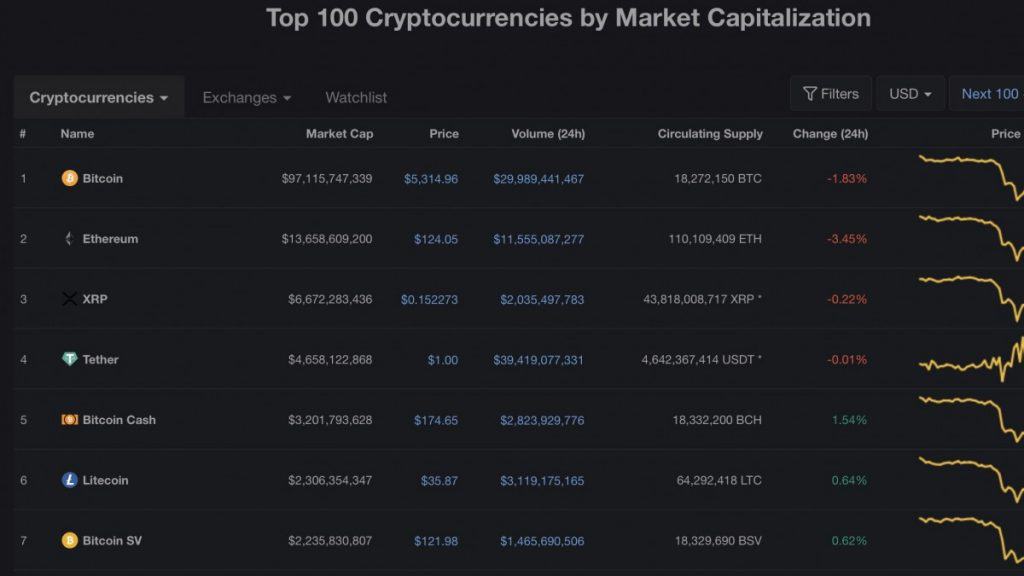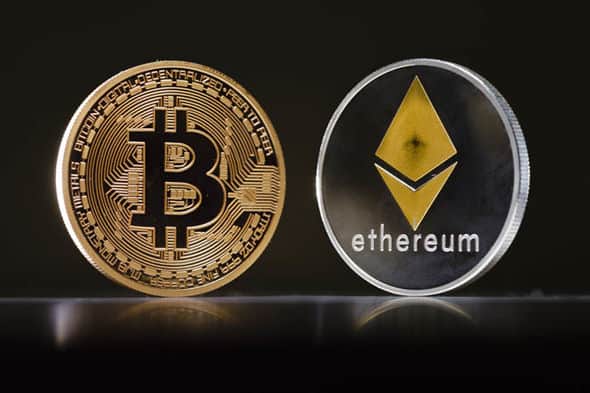Bitcoin was created in 2009 as a new way to bypass banks when saving and spending money. While many still view it as a convoluted pseudo currency or a fad or scam that could never replace traditional money, adoption and development continue to grow, both for bitcoin and all the different altcoins that came after the original. It can be difficult to choose which cryptocurrency to invest in when there are multiple options on the market
When investing, do altcoins depend on bitcoin? In general, there is a correlation between altcoins and Bitcoin. Most coins do depend on the value of bitcoin. Because bitcoin is the most known form of cryptocurrency and holds the most value, other altcoins often fluctuate in tandem with the value of bitcoin.
Factors that influence the value of bitcoin often have the same effects on altcoins. The cryptocurrency market is tied close to each other, and bitcoin holds a powerful influence over altcoins. If choosing to invest, it’s important to follow the market to make sound decisions investing in bitcoin or altcoins, as well as knowing how their value relationship.
It’s important to note that when discussing cryptocurrency, there are 3 different approaches to consider. Cryptocurrency can be viewed as a traditional transaction currency, as a store of value or investment, and as a utility platform for performing programmable functions. This is what makes cryptocurrency unique, and also contribute to the difficulty people have with understanding the value. Here we are only discussing the investment aspects and the market volatility that accompanies this.
How Altcoins Depend on Bitcoin
As established, the market for bitcoin and altcoins are close-knit, so altcoins usually follow bitcoin for the changes in value. Investors have not yet figured out that different blockchain platforms and their accompanying currency or token may not have anything to do with bitcoin. Ethereum decentralized apps or d’apps, for example, should have nothing to do with bitcoin prices. But the markets have not yet figured that out.
Many altcoins don’t compare in overall power, utility, popularity and sustainability like bitcoin, but some do. Right before the bitcoin price crash in early 2018, altcoins such as ether, XRP and litecoin had become almost as popular, while still correlated strongly with bitcoin pricing. Consequently, those faced a drop at the same time as the bitcoin crash.
One factor that artificially contributes to that perception is that many altcoins can only be purchased with bitcoin and not fiat currencies. This gives novice investors the impression that altcoins are therefore tied to bitcoin pricing. But it is a flawed assumption. Stocks are bought with USD, but their value has nothing to do with the dollar’s value in GBP, euros or yen, for example. Further, stock in Apple Corp has nothing to do with how a pharmaceutical company is performing. Eventually cryptocurrency investors will sort these things out.
Bitcoin Reigns Supreme
An easy way to define the importance of bitcoin is by comparing it to the U.S. dollar; it’s a good comparison for wealth and value. When an altcoin like ether gains popularity, it usually correlates with bitcoin prices, no matter what. According to cryptocurrency market analyst Michael van de Poppe, “Bitcoin is the king and the rest of the market will follow in the market.”
Bitcoin is increasing its dominance over altcoins, currently comprising 68.3% of the overall cryptocurrency market value (market cap.) Bitcoin is fluctuating wildly in value right now, partially in response to current world events in March 2020. For up to date pricing and market cap info, I use CoinMarketCap.
It has many useful sorting and ranking methods. Keep in mind that’s it’s always been my personal belief that the vast majority of altcoins listed there are junk. Many exist only for trading on exchanges. An extremely small number have actual use cases or are currently running on a blockchain platform for commercial use. For a full primer on how cryptocurrency works, read this intro.

Relationships Between Bitcoin and Altcoins
Most altcoins experience a positive correlation with bitcoin, so their behaviors with bitcoin are similar. Particular well-known altcoins fare similar to bitcoin, such as:
- bitcoin vs. litecoin
- The price patterns and fluctuations are similar to each other, and they are both intended as transactional currencies.
- bitcoin vs. ether
- Ether is the one altcoin that can vary from the positive correlation, and may eventually completely decouple, but often shares a correlation with bitcoin for long stretches.
- bitcoin vs. ripple (XRP)
- XRP reacts to changes in the market in more subtle ways, but repeat the same patterns as bitcoin
More on the Relationship Between Altcoins and Bitcoin
In general, bitcoin price movements affect altcoin prices and value. The fluctuation comes in the form of runs: bitcoin tends to fund altcoin runs and vice versa. It’s easy to follow this simple pattern:
- Bitcoin (BTC) steady = alts run = be in alts
- BTC runs = alts stagnate in dollars and drop in BTC as people sell alts for BTC = be in BTC
- BTC drops = everything drops, alts will tend to drop harder than BTC = be in dollars or stable coins (source: cryptocurrencyfacts.com)
The article on cryptocurrencyfacts also notes that the change in the cryptocurrency market doesn’t always follow a simple pattern. Usually the value of bitcoin comes in quick changes.
For example, when bitcoin prices quickly increase, bitcoin will:
- Suppress or depress alts as money flows into bitcoin (alts might hold their dollar value, but they will tend to lose BTC value), or
- Take alts along for the ride (generally true when a new wave of adoption is occurring). When BTC and alts go up you generally are better off being in alts (because they tend to outpace BTC’s gains).
Naturally, when bitcoin prices decrease, it will:
- Depress alts as money flows into fiat, which will cause people to withdraw investment from cryptocurrency altogether, or
- Cause alts to boom as money flows out of BTC and into alts.
- It’s important to reiterate that no altcoin has ever taken over the influence bitcoin has on the cryptocurrency market, so proceed with caution.
Altcoins can reap the benefits if bitcoin ever stagnates. In that case, bitcoin will:
- Cause alts to stagnate or drop. People want to wait for a clear sign on the direction of the market whether to keep investing or not.
- Or the alts market will boom as people look to gain profit in alts by trading in for favorable BTC pairs. People do this when investing in alts on a short-term basis.
The dependency of altcoins on bitcoin is at its most obvious when the bitcoin market is dropping. If you want to invest in altcoins, avoid them when bitcoin decreases in value. It’s all about strategy. Altcoin investors keep waiting for the markets to decouple, but it still hasn’t happened.

Correlation Between Bitcoin and Ethereum
Ethereum is considered one of the biggest altcoins in the cryptocurrency market, so its correlation to bitcoin is closely followed by many. The correlation coefficient is 0.68 presently.
Bitcoin and Ethereum have a strong positive relationship, therefore BTC and ETH will rise at the same time. If their relationship decouples, which many including myself think will happen, then there will no longer be a predictable pattern when comparing one to the other.
Ethereum was the cryptocurrency most correlated with bitcoin in 2019, coming in at 0.69 on average. Ethereum found the most success in the second half of the year as its correlation coefficient increased.
Binance Effect
Researchers established a theory for Ethereum’s relative success in the altcoin market known as the Binance Effect. This phenomenon is based on the fact that cryptos listed on Binance showed higher correlations than others not featured on Binance.
Being featured on Binance proves that comparing Bitcoin and altcoins is easy for finding correlations, but not for Bitcoin and its correlation to traditional assets, such as gold. Considering that Binance saw a 250% growth in the beginning of 2020, it continues to cement itself as the world’s leading crypto company.
According to Binance:
“With growing open interest for both Bitcoin and Altcoins perpetual markets, traders on Binance Futures may enjoy better liquidity as market participation grows. This means that traders can transact orders efficiently and quickly with little or no price impact.”
Ethereum in a Bull or Bear Market
Although the correlation between BTC and ETH is close, ETH and other altcoins usually follow the price trend of BTC, the dominant cryptocurrency. For example, in 2017, BTC and ETH moved purely based on the demand of the market. Since both were in a bull market, their movements were aligned.
However, in a bear market, BTC and other cryptocurrencies become a part of a general fall in the market, and altcoins tend to have delayed but bigger price swings. If you wonder why tokens have value, check out our summary.
Other intangible factors can affect the relationship between BTC and ETH, like expert forecasts, natural calamities, and major political events. But for the near future, as bitcoin dominates the crypto total market cap, the overall performance of the crypto market depends on bitcoin.
Ethereum may eventually not follow bitcoin price movements, even though the correlation between the two has intensified since the second half of 2019. However, Ethereum 2.0 was supposed to launch in 2019 to create real competition with bitcoin, but failed to do so.
Several studies have also been trying to establish a correlation pattern between cryptocurrency and equity markets. Sadly, none was identified and traders have been quick to suggest that correlation is not a reliable tool for market analysis (source: TWJ News). During major stock market downturns, the crypto markets tend to follow though.
The Worth of Investing in Altcoins
Earlier in January 2020, many altcoins exploded when Bitcoin was strong to start out the year. A phenomenon that can explain this action is called beta, described as a measure of volatility. It also explains the dependence of bitcoin for altcoins because a higher beta means greater price swings. Altcoins often have a higher beta even though they remain coupled to bitcoin pricing.
Alpha is a measure of an assets performance relative to a benchmark. In cryptocurrency, bitcoin is the benchmark. Very few altcoins have an alpha greater than 1.0 when compared to bitcoin over short or intermediate periods. Ethereum has bucked that trend in early 2020, outperforming bitcoin.
As for altcoins in this case, if bitcoin continues on its increase then these high beta altcoins will possibly outperform bitcoin at this time. Of course, they often underperform when bitcoin is on the way down, experiencing higher drops.
In the long run though, investors should deeply investigate whether the coin is real, has a strong development team, and is making progress in development of their underlying blockchain network. Many altcoins have been unnecessarily created to perform functions that are still better served via other methods. Those are likely to die completely.
In fact, many projects still being traded on exchanges are already dead. Investors just don’t know it yet. For a list of coins considered dead, visit DeadCoins.com.
The Promise in Cryptocurrency in 2020
In general, bitcoin is experiencing a positive momentum shift, which could have a major influence on altcoins.
On February 6th, bitcoin saw bids of $9,100 in Asian trading hours; an increase of 4% during the U.S. trading hours occurred in 24 hours. This event bodes well for altcoins.
Direct offspring of bitcoin, such as bitcoin cash and Bitcoin SV showed double-digit gains during this period. Another popular altcoin, litecoin, increased 5% in value. Ether showed the best gains in trades, with a 9% gain in this period and traded well above $200 in February 2020.
On a year-to-year basis, experts report that Ether has gained 63% this year, and Litecoin reports 78% gains this year. To compare, Bitcoin has a 34% gain. Note these performance numbers are as of the end of February.
In this case, there is a demand for alternative cryptocurrency that is affecting bitcoin. Investors purchase bitcoin and then route to alts, making more competition in the market.
To determine whether bitcoin will succeed in the bull market when closing out a month, a factor called the moving average convergence divergence (MACD) is put in place. The MACD:
- Look at the speed at which two moving averages relate to each other.
- Predicts momentum and price direction.
- Allows buyers to notice upward trends and volatility.
The MACD is currently losing upward momentum, which is influencing the bullish strength on ether against bitcoin.
Profitability of Altcoins
As of 2020, there are over 2,000 altcoins. Many were created to compete with bitcoin as a transactional currency, some serve a particular specialized function such a logistics or product tracking, while many, many others were simply scams created as money grabs.
Investors can enter the altcoin market by:
- Mining their own altcoin
- Purchasing from the market
- Receiving coin airdrops
- Receiving coins as payments
One thing to keep in mind with cryptocurrency investing is that tax treatment varies from country to country, and also varies depending on how you acquire and divest your holdings. US policies are explained here. Mined coins are taxed in the US as income at the value at the exact time received. If later sold at a profit or loss, that transaction must also be factored into taxes in the capital gains portions of your returns.
Coins received from sales of products, airdrops, or forks are also taxed as income received based on the value at that point. And they are also subject to additional reporting if sold later at a different price. Coins purchased and sold on exchanges are only subject to short term and long term capital gains reporting.
Study of Altcoin Profitability
A study from the University of California, San Diego examined the potential profitability of altcoin investment strategies through mining versus speculation. The researchers looked at 18 altcoins compared against bitcoin and litecoin for the study.
Their finding concluded that a miner can earn the highest returns on their altcoin if they start mining shortly after the altcoin is available on the market. Inversely, a speculator earns the lowest returns if they enter the altcoin market shortly after its availability.
This conclusion came to be by using opportunity cost to compare the relative cost of mining across different altcoins. The study elaborated that miners estimate the cost of mining for each coin, and that opportunity cost accounts for the lack of precise revenue detailed.
For validation to back up their findings, the opportunity cost is an efficient way to calculate mining costs because the cryptocurrency markets are efficient. The market price increases as more buzz generated from a new altcoin, attracting more miners. Afterward, miners are expected to sell their altcoin at a higher price because of the difficulty of mining in the market itself.
Do Altcoins Ever Differ from Bitcoin?
For value, altcoins still depend on bitcoin for any staying power. That being said, altcoins can differ from bitcoin in a number of ways. For example:
- Some altcoins are given away to all citizens of a country, therefore they have a different coin distribution method to bitcoin
- Others have different proof-of-working methods to try and rely less on bitcoin for monetary success
- Altcoins are created for purposes other than transactions.
- Certain altcoins are programmed differently that leads to differences in the privacy levels compared to bitcoin
These differences are not very significant because the majority of altcoins follow bitcoin’s model very closely. Many altcoins are simply mimics or derivatives of the bitcoin protocol, or attempted improvements on it, so it stands to reason they will remain coupled to bitcoin price movements.
An Inverse Relationship Between Altcoins and Bitcoin
While there is evidence that altcoins depend on bitcoin for a determination in their value, bitcoin can also have an inverse relationship with altcoins at times. This is termed a decoupling. It presents a great investment opportunity, but it isn’t predictable, just like most investment arenas.
When bitcoin is strong, alts fall because people sell their altcoins to return investing in bitcoin. On the contrary, when bitcoin is weak, altcoins become weak. Only when bitcoin stagnates do people go back to purchasing altcoins.
There are a few factors as to why altcoins and bitcoin have an inverse relationship:
- Liquidity: For cryptocurrency to be converted into US dollars, it needs to be liquidated from bitcoin only. With altcoins, it needs to be turned into bitcoin for this to happen (unless it’s ether, which is the other liquid cryptocurrency other than bitcoin).
- Bitcoin holds the most space in the market share: bitcoin has 68% of the market, and the rise of alts contributed to the decrease in Bitcoin’s market share
- Fundamentals: The bitcoin blockchain has never been hacked thanks to its most secure crypto maintenance. Because of this, many businesses are starting to allow bitcoin as a means of currency, not with altcoins.
In the inverse relationship, altcoins still are influenced by bitcoin’s performance in the cryptocurrency market. As trading pairs, most altcoins only pair well with bitcoin, so when bitcoin is stable, it forms as the ideal base currency for buying altcoins.
Bitcoin thrives in the bull market because it becomes easier to make gains in the largest market rather than make risky investments in smaller volume coins. Foundationally, it all revolves around bitcoin.
The Cryptocurrency Forums is an Amazon Associate. As an associate, we earn from qualifying purchases. We are also an affiliate of Trezor, Ledger, Coinbase, NordVPN, Ezoic, and WPX. Use of affiliate links does not add any cost to the buyer.

